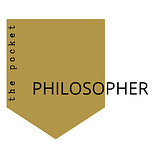Good morning friends,
Welcome to the Weekly Rundown. This week we explored ethics asking what it meant to live a good life, be happy, and do the “right” thing.
I’m so glad we had the foundation of happiness and epistemology to build off from the last few weeks. If you’re newer, heading over to some older posts might add a new dimension to this week’s conversation.
Now, for a review:
Monday
Our ability to communicate our own feelings, and to pick up the feelings of others and thus to heal fractures in connection, threatens the structures of hierarchy. Feelings of empathy and tender compassion for another’s suffering or humanity make it difficult to maintain or justify inequality.
—Carol Gilligan
We began the week approaching the good through the lens of care. Throughout history in industrialized societies care has been a virtue easily overlooked, as have the value and significance of caretakers.
We explored how often our world is based of an ethical framework of justice—punishment, separation, and retribution. The Ethics of Care, however, invites us not to see the world a zero-sum justice situation, but instead a fluid web of relationship.
At its core, Care occurs when people move from competition and concepts of hierarchy to cooperation and mutual support.
Tuesday
We then moved from Care to Love.
You have heard it was said, “You shall love your neighbor and hate your enemy. But I say to you, Love your enemies and pray for those who persecute you, so that you may be [children] of your father in heaven. For he makes the sun rise on the evil and the good, he sends the rain on the just and on the unjust.
—Jesus, Matthew 5:43-45
We explored how Jesus challenged notions of zero-sum justice in his collective teaching, instructing his followers even to love their enemies.
We compared this to the Stoic concept of judgements as a source of suffering.
If we can accept that our judgement of evil and good do not determine if one is truly an enemy, and if we can separate our happiness from our egoic need for punishment and retribution, the promise of Jesus is that we discover the bliss of being a child of god. The Buddha might have called this liberation or nirvana.
Love then is the decision to suspend ethical judgements about other people, and instead chose empathy.
You may believe them to be evil, but what if they believe themselves to be good? Moreover, what if you see yourself as good, and they see you as the enemy? Perhaps you hate them because of your judgement more than their moral failure?
Wednesday
“Right View is not an ideology, a system, or even a path. Right View is living insight that fills a person with understanding, love, and peace.”
—Thich Nhat Hanh
We then explored the Noble Eightfold Path not as a list of “dos,” but as a map to our deepest intention and ethical desires.
Quick review, the Eightfold Path is:
Right Action (not harmful to others, acting mindfully)
Right Speech (truth-telling)
Right Livelihood (earning a living in a way that does not cause suffering)
Right Mindfulness (aware of personal and collective emotions)
Right Effort (Effort on right things, like lovingkindness, compassion, and meditation)
Right Concentration (Developing focus for meditation)
Right View (Being mindful of actions' consequences)
Right Intention (Being clear about following this path)
At the core of unlocking the Eightfold Path in our lives is mindfullness—better said, the foundation of each path is deep mindfulness in some form. This mindfulness leads us to what we most desire.
Like the quotation above reads from Thich Nhat Hahn, Skillful living fills a person practicing the path with the states we all desire—love, peace, and kindness.
Thursday
Yesterday, we dove into ethics seen through mythology.
We started with a quote from Joseph Campbell taken from an interview he did with Bill Moyers in 1988
You see, these are experiences that go past ethical judgments. Ethics is wiped out. Our religions, with the accent on the human…also stress the ethical.
Campbell is one of the most prolific students of comparative religion and philosophy in the world. He compiled the stories of virtually every community available—from Navajo healing rituals to Sanskrit parables.
Campbell hypothesized a monomyth—one story told over and over again in thousands of contexts.
This myth is the story of the inward journey one takes in seeking self transparency, self honestly, and self awareness. It is the spiritual path of liberation and love.
Campbell wonders if myth, if this hero’s journey, occurs on a plane of our consciousness beyond ethics, beyond the right and wrong.
We ended the week wondering if ethics was the rulebook of the ego, and if myth was the map of the spiritual pilgrim to their deepest good.
Conclusion
Four days is not quite enough time to crack open the deepest layers of ethical history and arguments. However, we took a path that undoubtedly achieved our collective goal to increase our capacity for compassion and empathy.
While we could take any number of routes up the mountain and notice any number of similarities or pockets of distilled wisdom, I’ll leave us with a few thoughts that emerge for me in compiling this week’s content.
Please feel free to to comment in this letter, reply via email, or leave a comment on our IG page with your takeaways too. Philosophy is a conversation much more than a monologue, after all.
A global perspective leads one to believe that “the good” and “the right” can be absolutely fluid between cultures depending on their needs, environment, and collective goals.
A global perspective likewise causes one to acknowledge the similarities between virtually every culture in regards to life, death, and rebirth. These themes tend to point to the trip one takes through the little ego self to the big, conscious self. Is this journey the universal ethic?
Overwhelmingly, the good is most often a result of our perceptions and judgements. If we can hold our notions of the good lightly enough, we’re able to perceive how our friends and enemies might see themselves, and how they might see us. Such open-mindedness fosters deep experiences of empathy and compassion, even for those that hate us (or vice-versa).
It appears that if we can to learn to practice charity in our perceptions, humility with our beliefs, and remain committed to self-honestly we’re well on our way to fostering a personal ethic of empathy and compassion.
Here’s to the inward journey—the hero’s journey!
Have a great weekend, until next week.
-TPP
Image: https://en.wikipedia.org/wiki/Hero%27s_journey#/media/File:Heroesjourney.svg












